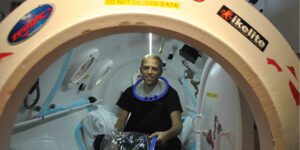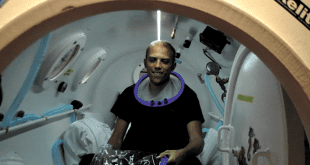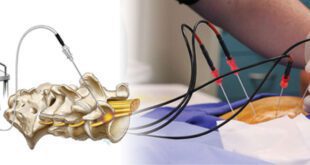 A traumatic brain injury (TBI) is caused by a blow to the head that damages the brain’s function and signaling. TBI’s can be mild to severe, and they can cause immediate and long-term damage. Depending on the severity.
A traumatic brain injury (TBI) is caused by a blow to the head that damages the brain’s function and signaling. TBI’s can be mild to severe, and they can cause immediate and long-term damage. Depending on the severity.
Traumatic brain injury (TBI) is the leading cause of death and disability in the US. Approximately 70-90% of the TBI cases are classified as mild, and up to 25% of them will not recover and suffer chronic neurocognitive impairments.1
HBOT and Brain Injury
Hyperbaric oxygen therapy (HBOT) is a medical treatment that delivers 100% oxygen to a patient’s pulmonary system while they are within a pressurized chamber. This saturation of oxygen allows high-levels of life-sustaining oxygen to be delivered to the tissues and organs. This increase of the partial pressure of oxygen at the cellular level accelerates the healing processes and assists in the recovery from numerous indications.
Numerous published literature and studies are indicating the efficacy of HBOT for traumatic brain injury. Research has been done on both animals and humans. It’s sometimes speculated that it’s best to receive HBOT within a short time frame after the TBI; however, HBOT can significantly improve TBI symptoms long after the trauma took place. Many patients and physicians see marked improvement and restoration within short and long-term healing.
HBOT can be a rigorous component of reducing inflammation. It also increases blood perfusion, reduces edema, stimulates and mobilizes stem cell production, and increases genetic and systemic regeneration of tissues.
A Study on The Effects of HBOT 1 to 6 Years After Injury
An Israeli trial lead by researcher Boussi-Gross, studied the effects of HBOT on TBI patients 1 to 6 years after their injury. These patients were experiencing Post-Concussion Syndrome (PCS) and complained of impaired cognitive functions for over a year, yet brain damage was below the detection level of MRI or CT brain imaging. Only patients who reported no change in cognitive function during one month prior to the beginning of the study were included.1 Along with imaging, including SPECT scans, six cognitive tests were also administered to rate improvement in brain functioning.
As mentioned, these patients showed no brain issues under MRI or CT; however, the SPECT scans showed the area of damage and blood flow issues before treatment. The following was shown after treatment: The changes in SPECT images after treatment indicate that HBOT led to reactivation of neuronal activity in stunned areas that seemed normal under CT and MRI imaging. While SPECT imaging has a limited spatial resolution (compared, for example, to fMRI), the changes in activity were sufficiently robust to be clearly detected by the SPECT images.1
Conclusions Show Marked Improvement
This study demonstrated that HBOT can induce neuroplasticity and significant brain function improvements in mild TBI patients with prolonged Post-Concussion-Syndrome at late chronic stage, years after injury. The results call for a better understanding of how to set the optimal HBOT protocol for the specific patients and how to determine which patients benefit the most from this treatment. The findings reported here bear the promises that HBOT can be effective in treating other brain impairments, like easing PTSD symptoms or repairing radiation damage. It is also reasonable to expect that HBOT can help slow down or even reverse metabolic disorders associated with neurodegenerative diseases.1
Hyperbaric Centers of Florida is a premier, state-of-the-art hyperbaric treatment facility located in the Tampa Bay area.
Currently, There Are 15 FDA Approved HBOT Conditions:
• Air or Gas Embolism
• Carbon Monoxide Poisoning
• Compromised Skin Grafts or Flaps
• Crush Injury, Compartment Syndrome
• Decompression Sickness (Bends)
• Diabetic & Other Non-healing Wounds
• Enhancement of Healing in Selected Problem Wounds
• Exceptional Anemia: Resulting of Bleeding
• Gas Gangrene
• Intracranial Abscess
• Osteomyelitis
• Radiation Injury
• Refractory Osteomyelitis
• Thermal Burns
• Idiopathic Sudden Sensorineural Hearing Loss
HBOT is used “off-label” for various disease states and disorders and HBOT may be ordered by a physician for off-label indications. Hyperbaric Centers of Florida makes no claims as to the efficacy for any indications other than the fifteen approved by FDA.
Common Off-Label Indications:
• Autism
• Brain Injury
• Bells Palsy
• Cerebral Palsy
• Cosmetic Surgery
• Infections
• Inflammations
• Lyme Disease
• Multiple Sclerosis
• Nerve Injuries
• Oral Disease
• Peripheral Neuropathy
• Rheumatoid Arthritis
• Scleroderma
• Shingles
• Severe Migraines
• Sports Injury
• Stroke
• Tendon Injuries
• Ulcerative Colitis
• Venomous snake and spider bites
Hyperbaric Oxygen Therapy
www.hyperbariccentersofflorida.com
To find out more, or to schedule your appointment today, please call Hyperbaric Centers of Florida at 813-788-3969.
References:
1. . R. Boussi-Gross, PLOS ONE, Hyperbaric Oxygen Therapy Can Improve Post-Concussion Syndrome Years after Mild Traumatic Brain Injury – Randomized Prospective Trial, November 15, 20013, https://doi.org/10.1371/journal.pone.0079995
 Central Florida Health and Wellness Magazine Health and Wellness Articles of the Villages
Central Florida Health and Wellness Magazine Health and Wellness Articles of the Villages



